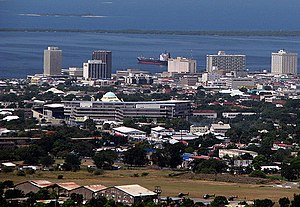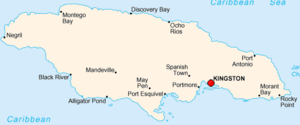Kingston, Jamaica: Difference between revisions
Uncle Dick (talk | contribs) m Reverted edits by 207.197.65.18 to last revision by Alansohn (HG) |
|||
| Line 43: | Line 43: | ||
Kingston is served by [[Norman Manley International Airport]] and also by the smaller and primarily domestic [[Tinson Pen Aerodrome]]. |
Kingston is served by [[Norman Manley International Airport]] and also by the smaller and primarily domestic [[Tinson Pen Aerodrome]]. |
||
david beane is gay |
|||
==History== |
|||
[[File:Map Kingston 1897.jpg|thumb|map of Kingston ca. 1890]] |
|||
[[Image:Kingston (1907).jpg|thumb|Bird's eye view of Kingston after the 1907 earthquake.]] |
|||
Kingston was founded on 22 July, 1692, as a place for refugees and survivors of the 1692 [[earthquake]] that destroyed [[Port Royal]]. Before the earthquake, Kingston’s functions were purely agricultural. The earthquake survivors set up a refugee camp on the sea front. Approximately two thousand people died due to mosquito borne diseases. Initially the refugees lived in a tented camp on Colonel Barry's ''Hog Crawle''. The town did not begin to grow until after the further destruction of Port Royal by the Nick Catania Pirate Fleet's fire in 1703. Surveyor John Goffe drew up a plan for the town based on a grid bounded by North, East, West and Harbour Streets. By 1716 it had become the largest town and the centre of trade for [[Jamaica]]. |
|||
The government sold land to people with the regulation that they would purchase no more than the amount of the land that they owned in [[Port Royal]], and only land on the sea front. Gradually wealthy merchants began to move their residences from above their businesses to the farm lands to the north on the plains of [[Liguanea]]. |
|||
The first free school, Wolmer's, was founded in 1729<ref>[http://www.wolmers.net/boys/history.html Wolmer's Boys School]</ref> and there was a theatre, first one in Harbour Street and then moved in 1774 to North Parade. Both are still in existence. In 1755 the [[List of Governors of Jamaica|governor]], [[Sir Charles Knowles, 1st Baronet|Sir Charles Knowles]], had decided to transfer the government offices from [[Spanish Town]] to Kingston. It was thought by some to be an unsuitable location for the Assembly in close proximity to the moral distractions of Kingston, and the next governor rescinded the Act. However, by 1780 the population of Kingston was 11,000, and the merchants began lobbying for the administrative capital to be transferred from Spanish Town, which was by then eclipsed by the commercial activity in Kingston. |
|||
[[Image:1882 Kingston Fire.png|thumb|Scenes in Kingston after the 1882 fire.]] |
|||
At the end of the 18th century, more than 3000 brick buildings were in the city. The harbour fostered trade and naval wars of the 18th century. Kingston took over the functions of Spanish Town (the capital at the time). These functions included, agriculture, commercial, processing, and a main transportation hub to and from Kingston and other sections of the island. |
|||
The government passed an act to transfer the government offices to Kingston from Spanish Town, and in 1872 the capital was transferred from Spanish Town to Kingston. It kept this status when the island was granted independence in 1962. |
|||
In 1907, 800 people died in another earthquake known as the 1907 Kingston earthquake, destroying nearly all the historical buildings south of Parade in the city. That was when a restriction of no more than {{convert|60|ft|m}} was instated on buildings in the central business district. These three story high buildings were built with reinforced concrete. Construction on King Street in the city was the first area to breach this building code. |
|||
During the 1930s, island wide riots lead to the development of [[trade unions]] and political parties to represent workers. |
|||
The city became home to the [[Mona, Jamaica|Mona]] campus of the [[University of the West Indies]] founded in 1948 with 24 medical students. |
|||
[[Image:Kingston, Jamaica IV.jpg|thumb|left|View of the Uptown [[New Kingston]] skyline (2007)]] |
|||
It wasn’t till the 1960s that major change occurred in the redevelopment of Kingston’s central business district. The international attention of [[reggae]] music at that time coincided with the expansion and development of {{convert|95|acre|m2}} of the Downtown Kingston water front area. |
|||
[[Image:Downtown Kingston waterfront.jpg|thumb|right|View of the Downtown Kingston waterfront showing the [[Bank of Nova Scotia]] and the [[Bank of Jamaica]] ]] |
|||
These developments lead to an influx of shops and offices, and the development of a new financial center: [[New Kingston]], which replaced the Knutsford Racetrack. Multi-story buildings and boulevards were placed within that section. |
|||
In 1966 Kingston was the host city to the [[1966 British Empire and Commonwealth Games|Commonwealth Games]]. |
|||
The westward section of the city was not the focus of development, and that area proved to be a tense area in political times. |
|||
The 1970s then saw deteriorating economic conditions that led to recurrent violence and a drop off in tourism which later affected the island. |
|||
In the 1980 general elections, the [[Democratic socialism|democratic socialist]] [[People's National Party]] (PNP) government was outvoted. |
|||
The subsequent governments have been open market oriented since the 1980s. Within a global urban era, the 1990s saw that Kingston has made efforts to modernize and develop its city structure and functions. Various organizations such as The Kingston Restoration Company, the Urban Development Corporation (UDC) and the Port Authority of Jamaica, along with the [[Port Royal]] Development Company, among others sought to develop the urban structure of the city. |
|||
==Religion== |
==Religion== |
||
Revision as of 18:17, 22 May 2009
City of Kingston | |
|---|---|
 Downtown Kingston and the Port of Kingston | |
| Motto: A city which hath foundations[1] | |
 Location of Kingston shown within Jamaica | |
| Country | |
| County | Surrey |
| Parish | Kingston |
| Established | 1692 |
| Area | |
| • Total | 480 km2 (190 sq mi) |
| Elevation | 9 m (30 ft) |
| Population (2001) | |
| • Total | 651,880 |
| • Density | 1,358/km2 (3,520/sq mi) |
| • Kingston Parish | 96,052 |
| • St. Andrew Parish | 555,828 |
| Time zone | UTC-5 (EST) |
Kingston is the capital and largest city of Jamaica and is located on the southeastern coast of the island country. It faces a natural harbour protected by the Palisadoes, a long sand spit which connects Port Royal and the Norman Manley International Airport to the rest of the island. In the Americas, Kingston is the largest predominantly English-speaking city south of the United States.
The local government bodies of the parishes of Kingston and St. Andrew were amalgamated by the Kingston and St. Andrew Corporation Act of 1923, to form the Kingston and St. Andrew Corporation (KSAC). Greater Kingston, or the "Corporate Area" refers to the KSAC; however, it does not solely refer to Kingston Parish, which only consists of the old downtown and Port Royal. Kingston Parish had a population of 96,052, and St. Andrew had a population of 555,828 in 2001.[2]
The city proper is bounded by Six Miles to the west, Stony Hill to the north, Papine to the northeast and Harbour View to the east. Communities in rural St. Andrew such as Gordon Town, Mavis Bank, Lawrence Tavern, Mt. Airy and Bull Bay would not be described as being in Kingston.
Two parts make up the central area of Kingston: the historic but troubled Downtown, and New Kingston. Several reggae stars, including Buju Banton, Sean Paul, Bounty Killer, and Beenie Man, hail from Kingston. Attractions include the nearby Hellshire and Lime Cay beaches, the National Gallery of Jamaica, the ruins of Port Royal, and Devon House, a mansion with adjoining park that once belonged to Jamaica's first black millionaire. Several annual and well-visited festivals are held in Kingston.
Kingston is served by Norman Manley International Airport and also by the smaller and primarily domestic Tinson Pen Aerodrome.
david beane is gay
Religion
There are a wide variety of Christian churches in the city. Most are Protestant, a legacy of British colonization of the island. The chief denominations are Church of God, Baptist, Anglican, Methodist, Roman Catholic, Seventh-day Adventist, and Pentecostal. Afro-Christian syncretic religions are also widespread.
There is a Jewish synagogue in the city as well as a large number of Buddhists and Muslims.
Geography
Kingston is surrounded by the Blue Mountains, Red Hills, Long Mountain and the Kingston Harbour. The city is situated on the Liguanea Plain, an alluvial plain located next to the Hope River. Kingston experiences frequent earthquakes, including the 1907 earthquake.
Climate
Kingston has a tropical climate, characterized by a wet season from May to November, which coincides with the hurricane season, and a dry season from December to April. During the dry season, there is not much rainfall, however, cold and stationary fronts occur at this time, and often bring heavy showers, especially in March. Kingston is located in the rain shadow of the Blue Mountains; therefore, little to none of the moisture of the Northeast Trade Winds carry falls over Kingston, causing Kingston to be very dry in comparison to Portland and Saint Mary on the windward side of the Blue Mountains. Kingston is on a coastal location, hence it comes under the influence of the sea, though dense urban development can negate this effect. In the 21st century, Kingston has experienced temperatures as high as 34°C (93.2°F) and temperatures as low as 25°C (77°F). Between 1895 and 1990, the total average rainfall was recorded at 909.7 mm (35.8 inches), the highest monthly average rainfall recorded in October at 181.1 mm (7.1 inches), and the lowest monthly average rainfall recorded in March at 22.7 mm (0.9 inches).[3]
Neighbourhoods and districts
|
|
|
Law
The Jamaica Constabulary Force, Jamaica's police force, is based on Old Hope Road near Liguanea. Smaller police stations, such as Hunt's Bay, Matilda's Corner and Half-Way-Tree, are dispersed across the Corporate Area. The Supreme Court of Jamaica is also located in Kingston. Other courts, such as the Half-Way-Tree Resident Magistrate's Court, Gun Court, Traffic Court and Family Court, make Kingston their home. The Jamaica Defence Force (JDF) has its headquarters at Up Park Camp near New Kingston and Cross Roads. The JDF also operates a major naval base at Port Royal.
Media and communications
The Gleaner Company, the Jamaica Observer and the Sunday Herald, three of Jamaica's large newspaper companies, make their home in Kingston. Several television and radio stations including Television Jamaica (TVJ), CVM TV, RJR 94 FM,TBC 88.5 FM, Hitz 92 FM, FAME 95 FM, LOVE TV, ZIP 103, Kool 97 FM and LOVE FM, are all based in Kingston. Kingston generally has an adequate telecommunications service, administered by either Cable and Wireless or Flow Jamaica. Cellular phone service is also very strong in Kingston, especially since Cable & Wireless, Digicel and Claro, Jamaica’s three cellular providers, are all based in the city.
Services
Kingston, as the capital, is the financial, cultural, economic and industrial centre of Jamaica. Many financial institutions are based in Kingston, and the city boasts the largest number of hospitals, schools, universities and cultural attractions of any urban area on the island. Some notable landmarks in Kingston include, the University of the West Indies, Jamaica Defence Force Museum, and Bob Marley Museum.
Notable residents
Sister cities
Kingston has five sister cities:
 Miami, Florida, United States
Miami, Florida, United States Kalamazoo, Michigan, United States
Kalamazoo, Michigan, United States Coventry, England, United Kingdom
Coventry, England, United Kingdom Guadalajara, Mexico
Guadalajara, Mexico Shenzhen, China
Shenzhen, China
